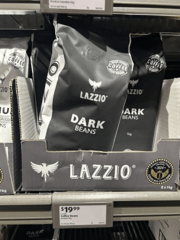Are you risking a $2,500 bill by ordering this everyday item online? Here’s what happened to this Aussie
- Replies 0
Ordering everyday items online has become second nature for many Aussies, especially since the pandemic made us all a bit more comfortable with shopping from the couch in our pyjamas.
But what happens when your innocent online order turns into a bureaucratic nightmare—and a whopping $2,500 bill—before you even get your hands on your purchase?
That’s exactly what happened to Andy Lowry, a young Australian business owner who runs the clothing store Pamboes.
Andy’s story is a cautionary tale for anyone who’s ever thought about importing goods, whether it’s for business or just to snag a bargain on something you can’t find locally.
Andy’s business relies on selling ‘blanket hoodies’—those oversized, snuggly garments that are perfect for chilly winter nights.
He placed an order for a shipment from China, expecting the usual routine: a bit of paperwork, maybe a small customs fee, and then his stock would be ready to sell just in time for the winter rush.

But when the shipment arrived in Australia, things took a turn. The Australian Border Force (ABF) flagged the goods for inspection, searching for illegal materials. After a thorough check, they found nothing suspicious. You’d think that would be the end of it, right? Not quite.
Instead, Andy was hit with a $2,524 bill for airport storage fees. The kicker? He couldn’t collect his goods until he paid up.
‘Apparently because I’m the importer on record, I had to pay that $2,524 bill and they pretty much told me to get stuffed,’ Andy said. ‘This is like the cost of doing business essentially.’
Andy’s experience highlights a little-known risk for anyone importing goods into Australia.
While we all know about customs duties and GST, few realise that if your shipment is held up for inspection—even if you’ve done nothing wrong—you can be charged hefty storage fees by the shipping company or airport.
These fees rack up daily while your goods sit in limbo, waiting for clearance.
Andy’s frustration grew as the days ticked by. ‘At this point I’m getting stressed because they can’t give me a timeframe. I’m like, how long are they going to keep it for?’ he said.
After a week and a half, the storage charges had ballooned to over $2,500. ‘For what? A hoodie?’ he asked.
Source: @pamboes / Tiktok.
When Andy tried to dispute the charges, he was told he’d have to lodge a complaint with the Department of Home Affairs—an arduous process with no guarantee of success. In the meantime, he had no choice but to pay up if he wanted his stock released.
For Andy, the timing couldn’t have been worse. His business is seasonal, relying on customers buying loungewear at the start of winter. The two-week delay cost him dearly—he estimates he lost over six figures in potential sales.
‘Understandably, customers do their winter shopping at the beginning of winter so they can get full use out of whatever they have bought,’ he explained.
Andy started Pamboes during the Covid pandemic, spotting a gap in the market for comfy, blanket-style clothes. While he’s had a mostly smooth run, this experience was a stark reminder of the risks involved in importing.
‘Border holds cost companies millions each year and it’s not something you can really prepare for, it’s almost a random check,’ he said.
You might be wondering: why should the importer be on the hook for these fees, especially when the goods are being held for government checks? The answer lies in the fine print of international shipping and customs regulations.
When goods arrive in Australia, they’re often stored in commercial warehouses or airport facilities.
If the ABF decides to inspect your shipment, it can sit there for days or even weeks. The storage company charges for every day your goods occupy valuable space, and those costs are passed directly to you, the importer.
While some shipping companies may waive or reduce these fees as a goodwill gesture, most are businesses themselves and can’t afford to absorb the costs—especially with port and warehouse space at a premium.
Despite the setback, Andy isn’t giving up. He’s moving forward with new designs and a winter sale to clear out remaining stock.
‘We understand they have to keep our borders safe, but we pay taxes at the border. You would think part of those taxes we pay would cover ABF’s work,’ he said.
Read more: Remote retailers warn businesses could 'collapse' when federal Centrepay crackdown takes effect

Have you ever had a shipment held up at the border, or been hit with surprise fees when ordering from overseas? Do you think the current system is fair, or should there be more protection for importers? Share your stories and thoughts in the comments below!
But what happens when your innocent online order turns into a bureaucratic nightmare—and a whopping $2,500 bill—before you even get your hands on your purchase?
That’s exactly what happened to Andy Lowry, a young Australian business owner who runs the clothing store Pamboes.
Andy’s story is a cautionary tale for anyone who’s ever thought about importing goods, whether it’s for business or just to snag a bargain on something you can’t find locally.
Andy’s business relies on selling ‘blanket hoodies’—those oversized, snuggly garments that are perfect for chilly winter nights.
He placed an order for a shipment from China, expecting the usual routine: a bit of paperwork, maybe a small customs fee, and then his stock would be ready to sell just in time for the winter rush.

An Australian business owner, Andy Lowry, was forced to pay over $2,500 in airport storage fees after his shipment of 'blanket hoodies' from China was seized and held by Australian Border Force, even though nothing illegal was found. Image source: @pamboes / Tiktok.
But when the shipment arrived in Australia, things took a turn. The Australian Border Force (ABF) flagged the goods for inspection, searching for illegal materials. After a thorough check, they found nothing suspicious. You’d think that would be the end of it, right? Not quite.
Instead, Andy was hit with a $2,524 bill for airport storage fees. The kicker? He couldn’t collect his goods until he paid up.
‘Apparently because I’m the importer on record, I had to pay that $2,524 bill and they pretty much told me to get stuffed,’ Andy said. ‘This is like the cost of doing business essentially.’
Andy’s experience highlights a little-known risk for anyone importing goods into Australia.
While we all know about customs duties and GST, few realise that if your shipment is held up for inspection—even if you’ve done nothing wrong—you can be charged hefty storage fees by the shipping company or airport.
These fees rack up daily while your goods sit in limbo, waiting for clearance.
Andy’s frustration grew as the days ticked by. ‘At this point I’m getting stressed because they can’t give me a timeframe. I’m like, how long are they going to keep it for?’ he said.
After a week and a half, the storage charges had ballooned to over $2,500. ‘For what? A hoodie?’ he asked.
Source: @pamboes / Tiktok.
When Andy tried to dispute the charges, he was told he’d have to lodge a complaint with the Department of Home Affairs—an arduous process with no guarantee of success. In the meantime, he had no choice but to pay up if he wanted his stock released.
For Andy, the timing couldn’t have been worse. His business is seasonal, relying on customers buying loungewear at the start of winter. The two-week delay cost him dearly—he estimates he lost over six figures in potential sales.
‘Understandably, customers do their winter shopping at the beginning of winter so they can get full use out of whatever they have bought,’ he explained.
Andy started Pamboes during the Covid pandemic, spotting a gap in the market for comfy, blanket-style clothes. While he’s had a mostly smooth run, this experience was a stark reminder of the risks involved in importing.
‘Border holds cost companies millions each year and it’s not something you can really prepare for, it’s almost a random check,’ he said.
You might be wondering: why should the importer be on the hook for these fees, especially when the goods are being held for government checks? The answer lies in the fine print of international shipping and customs regulations.
When goods arrive in Australia, they’re often stored in commercial warehouses or airport facilities.
If the ABF decides to inspect your shipment, it can sit there for days or even weeks. The storage company charges for every day your goods occupy valuable space, and those costs are passed directly to you, the importer.
While some shipping companies may waive or reduce these fees as a goodwill gesture, most are businesses themselves and can’t afford to absorb the costs—especially with port and warehouse space at a premium.
Despite the setback, Andy isn’t giving up. He’s moving forward with new designs and a winter sale to clear out remaining stock.
‘We understand they have to keep our borders safe, but we pay taxes at the border. You would think part of those taxes we pay would cover ABF’s work,’ he said.
Read more: Remote retailers warn businesses could 'collapse' when federal Centrepay crackdown takes effect
Key Takeaways
- An Australian business owner, Andy Lowry, was forced to pay over $2,500 in airport storage fees after his shipment of 'blanket hoodies' from China was seized and held by Australian Border Force, even though nothing illegal was found.
- The unexpected fee and shipping delays put Mr Lowry behind schedule for launching his winter products, causing what he estimates to be a six-figure loss in sales for his seasonal business.
- As the importer of record, Mr Lowry was held responsible for all costs incurred during border processing, with no guarantee of reimbursement unless he lodged a formal complaint with the Department of Home Affairs.
- Mr Lowry highlighted that such costly delays at the border are an ongoing risk for Australian importers, arguing that these 'random checks' and associated charges make doing business tougher, especially for small and seasonal operations.
Have you ever had a shipment held up at the border, or been hit with surprise fees when ordering from overseas? Do you think the current system is fair, or should there be more protection for importers? Share your stories and thoughts in the comments below!







